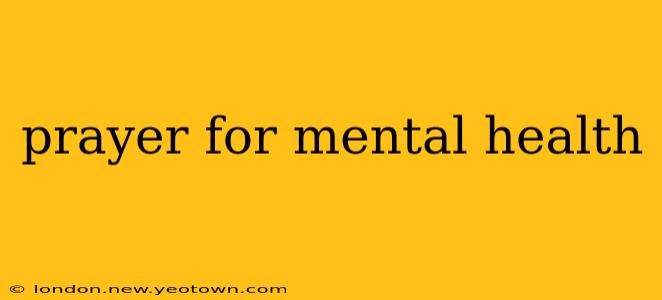The quiet hum of anxiety, the crushing weight of depression, the swirling chaos of a troubled mind – these are battles many of us face. Mental health struggles are real, and they're often fought in the unseen corners of our hearts. But even in the darkest moments, hope remains, and prayer can be a powerful ally in our journey towards healing and wholeness. This isn't about a quick fix, but about finding strength and solace in a higher power.
This prayer isn't just for those currently struggling; it's for anyone seeking peace and resilience for themselves or for loved ones. It's a prayer for strength, understanding, and the grace to navigate the complexities of the human mind.
What is the best way to pray for mental health?
There's no right or wrong way to pray. Prayer is a deeply personal conversation, a connection with something bigger than ourselves. Some find solace in structured prayers, others in quiet reflection. Some pray aloud, others in the silence of their hearts. The most important element is sincerity and openness. Let your heart guide you. You might find comfort in repeating affirmations, meditating on scripture, or simply pouring out your heart to a higher power.
How can prayer help with mental illness?
Prayer can offer several benefits for those struggling with mental health challenges:
-
Connection and Support: Feeling alone is a common experience in mental health struggles. Prayer offers a connection to something larger than yourself, a source of comfort and support in times of distress.
-
Hope and Resilience: Prayer can cultivate hope, reminding us that even in darkness, there is light. It can foster a sense of resilience, the strength to keep going even when it feels impossible.
-
Perspective and Peace: Prayer can help us shift our perspective, finding peace amidst the chaos. It can bring clarity and a sense of calm amidst overwhelming emotions.
-
Acceptance and Self-Compassion: Mental health journeys are often difficult. Prayer can facilitate self-acceptance and compassion, allowing us to acknowledge our struggles without self-judgment.
What are some specific prayers for mental health?
Here are a few examples to inspire you; feel free to adapt them to your own words and needs:
Prayer for Strength:
Loving God, I come before you today carrying the weight of my mental health struggles. Grant me the strength I need to face each challenge, the courage to seek help, and the resilience to keep moving forward. Fill me with your peace and your love.
Prayer for Healing:
Divine Healer, I ask for your healing touch upon my mind and spirit. Mend the broken places, soothe the aching heart, and restore my inner peace. Guide me towards healing and wholeness.
Prayer for Loved Ones:
Gracious God, I pray for [Name], who is struggling with their mental health. Surround them with your love and comfort. Grant them strength, hope, and the guidance they need to find healing. Give me the wisdom and compassion to support them on their journey.
Is prayer a substitute for professional help?
It's crucial to understand that prayer is not a replacement for professional mental health care. Prayer can be a valuable complement to therapy, medication, and other treatments, but it shouldn't be used as a sole approach to managing mental illness. Seeking help from qualified professionals is essential for effective treatment and support.
How can I find resources for mental health support?
If you're struggling with your mental health, please reach out for help. There are many resources available:
- Your primary care physician: They can provide referrals to mental health professionals.
- Mental health professionals: Therapists, counselors, and psychiatrists offer various types of therapy and treatment.
- Crisis hotlines: These provide immediate support in times of crisis.
- Support groups: Connecting with others facing similar challenges can be incredibly helpful.
Remember, you are not alone. Seek help, and allow prayer to be a source of strength and comfort on your journey to healing and wholeness.

